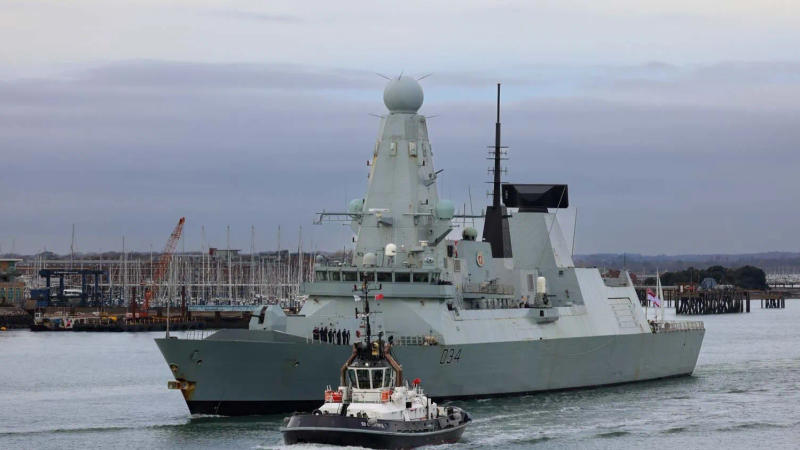Published 18:02 IST, November 30th 2023
UK's advanced warship, HMS Diamond charts course in Op Kipion to Safeguard Global Waters
As part of Operation Kipion, HMS Diamond will play a pivotal role in safeguarding vital sea trade routes while addressing multifaceted challenges.

Amid the dynamic geopolitical landscape, United Kingdom has deployed its Type 45 ‘Daring-class’ air-defence destroyer HMS Diamond in the Middle East. The move aims to reinforce the UK's maritime influence, Defence Secretary Grant Shapps disclosed the departure of HMS Diamond to join Operation Kipion. The deployment aims to heighten the UK's presence in the Gulf and the Indian Ocean, underlining a commitment to enhance global maritime security.
HMS Diamond, recognized as one of the world's most advanced warships, embarks on a crucial mission to safeguard vital sea trade routes. This deployment comes in response to escalating concerns over maritime security at chokepoints worldwide, emphasizing the strategic importance of uninterrupted global trade.
The Type 45 destroyer stands as a testament to the United Kingdom's endeavor for naval supremacy. This class, comprising six guided-missile destroyers, was meticulously crafted for the Royal Navy in the early 21st century. Each vessel in this class is a technological marvel, meticulously designed to excel in anti-aircraft and anti-missile warfare scenarios.
Operation Kipion: UK’s maritime initiative
Operation Kipion, a longstanding UK maritime initiative, encompasses not only HMS Diamond but also a squadron of mine-hunting vessels and a Royal Fleet Auxiliary support ship. These assets work in tandem under the command of the UK Maritime Component Command in Bahrain, collaborating with regional allies to ensure the security of Middle East trade routes.

HMS Diamond's deployment includes a Wildcat helicopter, a highly capable aircraft integral to previous successful missions. The decision to reinforce naval presence is influenced by recent geopolitical events, including the Israel-Hamas conflict and the seizure of MV Galaxy Leader by the Houthis in the Red Sea.
Deterring escalation in conflict zones
Grant Shapps emphasized the critical role of the Middle East in global security, citing recent events as compelling reasons for bolstering the UK's presence in the region. He highlighted the multifaceted challenges, from deterring escalation in conflict zones to countering unlawful seizures, necessitating a proactive stance to safeguard British interests.
The Defence Secretary stressed that the deployment of HMS Diamond underscores the UK's commitment to regional security. By fortifying naval patrols, the Royal Navy aims to keep crucial trade routes open, ensuring the resilience of global commerce. Shapps concluded by affirming that the commitment to regional security not only endures but evolves to meet the demands of an increasingly dynamic geopolitical landscape.
Shapps highlighted the strategic importance of maritime routes in the Gulf, emphasizing their role in facilitating the passage of merchant ships, including those carrying a significant portion of the UK's liquefied natural gas supply. With approximately 50 large merchant ships daily transiting the Bab-el-Mandeb and 115 major vessels navigating the Strait of Hormuz, these waterways remain vital for global trade.
Notably, the deployment of HMS Diamond marks a pivotal moment in the UK's naval strategy, aligning with broader geopolitical considerations and reinforcing the nation's commitment to global maritime security.
Updated 18:02 IST, November 30th 2023




